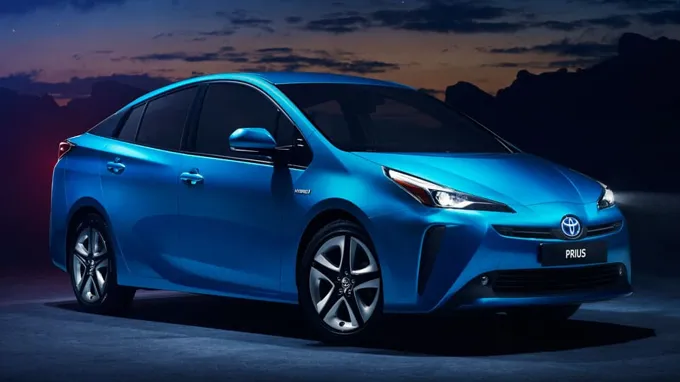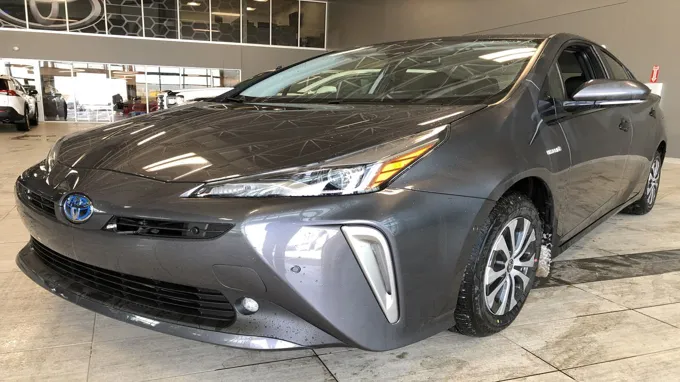Are you finding it hard to choose the right car that fits your adventurous lifestyle? Maybe you have considered hybrid vehicles like the Toyota Prius? As a popular hybrid car, the Toyota Prius has been around for over two decades with several models, features, and upgrades. However, some people are not sure if it can handle off-road situations due to its engine size. One of the most frequently asked questions is, “Is the Toyota Prius all-wheel drive?” We’ll answer this question and more in this blog, so sit tight and let’s dive in.
For most Toyota Prius models, the answer to the question above is “No.” The Toyota Prius is a front-wheel-drive car that provides impressive fuel efficiency and low carbon emissions while driving on paved roads. However, some models like the Toyota Prius AWD-e feature an all-wheel-drive system that can provide additional grip and stability on slippery roads.
Although it is not designed for off-road driving, the Toyota Prius can handle rough terrain well and provide a smooth ride due to its low center of gravity and outstanding suspension system. Additionally, the Toyota Prius hybrid engine system ensures you save money on gas and protect the environment while exploring. In summary, the Toyota Prius is a reliable and efficient car that can handle different driving situations with ease.
If you prioritize fuel efficiency and eco-friendliness over all-wheel drive, the Toyota Prius is a great option. However, if you live in an area with harsh weather conditions or need more stability and traction on rough terrain, you may want to consider the Toyota Prius AWD-e model. Either way, the Toyota Prius is an excellent hybrid car that can help you enjoy your trips while saving money and protecting the environment.
Table of Contents
Understanding the Toyota Prius
The Toyota Prius is a hybrid electric car that is renowned for its fuel efficiency and eco-friendliness, but is it all-wheel drive? Unfortunately, the answer is no. The Prius only comes in a front-wheel drive configuration, which means that the power is only sent to the front wheels. However, this doesn’t mean that the Prius isn’t capable of handling different terrains and weather conditions.
In fact, the Prius has great traction control that allows it to stay stable even in slippery road conditions. It also has a low center of gravity, which makes for a smooth and comfortable ride. Although the Prius lacks all-wheel drive capabilities, it is still a reliable and practical car for anyone looking to reduce their carbon footprint and save money on fuel costs.
So, if you’re not in need of all-wheel drive, the Prius is definitely worth considering.
What is the Toyota Prius?
The Toyota Prius is a popular hybrid car that has been around since 199 It’s known for its fuel efficiency and eco-friendliness, making it a popular choice for those who want to reduce their carbon footprint. The Prius uses both a gasoline engine and an electric motor to power the car, and it can switch between the two depending on driving conditions.
This means that the car can run on gas, electricity, or both, making it extremely versatile. The Prius is also known for its spacious interior, comfortable ride, and advanced features like a touchscreen display and backup camera. Overall, the Toyota Prius is a reliable and efficient car that has helped to pave the way for hybrid cars in the automotive industry.

How does the Toyota Prius work?
The Toyota Prius is a hybrid car that uses both gasoline and electric power to run. The car works by utilizing a system called the hybrid synergy drive, which enables the gasoline engine and electric motor to work together or separately as required. When the car initially starts, the electric motor is used to power the car and move it forward until it reaches a certain speed.
At that point, the gasoline engine kicks in and begins to help power the car. The car also automatically switches between electric and gasoline power during normal driving for maximum efficiency. The Prius also uses regenerative braking technology to help recharge the electric battery while driving.
Overall, the Toyota Prius is an innovative and efficient hybrid car that is designed to reduce emissions and save fuel.
All-Wheel Drive Explained
If you’re in the market for a Prius and are wondering whether it comes with all-wheel drive, the answer is no. The Prius is equipped with a front-wheel-drive system, which is standard for most sedans and hatchbacks. All-wheel drive, on the other hand, sends power to all four wheels instead of just two, making it more suitable for adverse weather conditions and off-road driving.
While some other Toyota models offer all-wheel drive, the Prius was designed with fuel efficiency in mind, resulting in its front-wheel-drive setup. However, just because the Prius doesn’t have all-wheel drive doesn’t mean it’s not capable of handling difficult terrain or inclement weather. With its advanced traction control system and low center of gravity, the Prius can navigate slippery roads with ease.
So, if you’re looking for a fuel-efficient and reliable car that’s great for everyday driving, the Prius is a great choice, even without all-wheel-drive.
What is All-Wheel Drive?
All-wheel drive, also known as AWD, is a drivetrain system that powers all four wheels of a vehicle simultaneously. Unlike a two-wheel drive system, which only powers either the front or rear wheels, all-wheel drive provides superior traction and handling in various conditions. This is because all-wheel drive systems distribute power to each wheel independently, allowing for better control on slippery or uneven surfaces.
Think of it like having an extra set of hands to help you maintain control while driving in rain, snow, or other challenging environments. All-wheel drive can be found on a variety of vehicles, from sedans to SUVs, and is often a valuable feature for those who frequently drive in adverse weather conditions or off-road environments. With all-wheel drive, you can take on any road with confidence and enjoy improved stability, handling, and performance.
Benefits of having All-Wheel Drive
All-Wheel Drive Explained If you’re shopping for a car or just curious about the benefits of All-Wheel Drive (AWD), you’ve come to the right place. All-wheel drive is a type of drivetrain in which all four wheels receive power from the engine simultaneously. This means that power is distributed evenly to all the wheels, providing more traction and stability in slippery and uneven terrain.
Unlike with Front-Wheel Drive (FWD) or Rear-Wheel Drive (RWD), where power is delivered to only two wheels, AWD ensures that all four wheels are working in unison, making it easier for the car to get moving in challenging conditions. Additionally, AWD cars tend to have better handling and cornering performance than their FWD or RWD counterparts. Whether you’re driving up a snowy mountain pass or through a muddy field, an AWD car will give you the confidence and control you need to tackle any challenge.
So if you’re looking for a car with good performance and excellent all-around capability, consider getting one with All-Wheel Drive.
Drawbacks of having All-Wheel Drive
All-Wheel Drive Explained All-Wheel Drive (AWD) is an innovative technology that enables vehicles to have exceptional performance in various driving conditions. AWD provides power to all four wheels of a car, rather than just the front or rear wheels, allowing for better traction and stability on slippery or uneven roads. This unique feature is useful in off-road adventures, driving on snow-clad roads, and can also improve the overall handling of a car while driving through steep curves or winding roads.
However, while AWD is undoubtedly beneficial, it does come with some drawbacks. One of the significant drawbacks of AWD is the significant increase in fuel consumption due to the increased weight and friction of the added powertrain components. Additionally, the added complexity of the AWD system can increase maintenance costs.
Moreover, AWD cars tend to have a higher upfront cost compared to two-wheel-drive cars. Therefore, potential car buyers must weigh the pros and cons of having an AWD car before making their final purchase decision.
Is the Toyota Prius All-Wheel Drive?
Many people may be wondering if the Toyota Prius is all-wheel drive. Unfortunately, the answer is no. The Prius is actually a front-wheel drive car.
While it may not have the added traction and stability that comes with all-wheel drive, the Prius does make up for it in fuel efficiency. It’s one of the most fuel-efficient cars on the market, which is one of the reasons why it’s such a popular choice among eco-conscious drivers. So, if you’re looking for an all-wheel drive car, the Prius may not be the right choice for you.
But, if you’re looking for a car that’s going to save you money on gas and reduce your carbon footprint, the Prius is definitely worth considering.
Toyota Prius Models
The Toyota Prius is one of the most popular hybrid cars on the market today. But what about its all-wheel drive capabilities? Unfortunately, the answer is no. As of now, there is no Toyota Prius model that comes equipped with all-wheel drive.
This may be a disappointment to those who live in areas with snowy or slippery roads, but the good news is that the front-wheel drive system in the Prius still offers excellent traction and handling. Plus, the Prius is known for its outstanding fuel economy and low emissions, making it a great choice for eco-conscious drivers. Who knows, maybe Toyota will release an all-wheel drive Prius model in the future.
For now, though, the standard front-wheel drive system does the job just fine.
Prius All-Wheel Drive: Available or Not?
If you’re considering buying a Toyota Prius, you might be wondering if it’s available with all-wheel drive. The answer is yes and no. Currently, there are two models of the Prius available with all-wheel drive: the Prius AWD-e and the Prius Prime AWD-e.
These models feature an additional motor that powers the rear wheels, providing extra traction in slippery conditions. However, not all Prius models have this feature. If you’re looking for all-wheel drive capability, it’s important to make sure you choose one of these two options.
Overall, the Prius is a great choice for eco-conscious drivers who want a fuel-efficient car that’s also available with all-wheel drive when needed.
Final Thoughts
If you’re wondering whether the Prius is all-wheel drive, the answer is no. The Toyota Prius is a front-wheel drive vehicle, meaning that only the front wheels receive power from the engine and propel the car forward. While the lack of all-wheel drive may be disappointing for some drivers, it allows for better fuel efficiency and lower emissions, which are key features of the Prius.
However, Toyota has recently introduced an all-wheel drive option for the Prius in some markets, including Canada and Japan. This new model, known as the Prius AWD-e, adds an electric motor to the rear axle, providing extra traction and stability on slippery surfaces such as snow or ice. So, if all-wheel drive is a must-have feature for you, be sure to check if the Prius AWD-e is available in your area.
Conclusion
In conclusion, the answer to the question “is Prius all-wheel drive?” is simple: no, it’s not. But that doesn’t mean it’s any less impressive. The Prius boasts exceptional fuel efficiency and reliability, making it a top choice for eco-conscious drivers.
So while it may not have all-wheel drive, it certainly has all the features that make it one of the world’s most popular hybrid cars. Plus, if you really need four-wheel traction, just remember: nothing beats a good set of snow tires.”
FAQs
Is the Toyota Prius all-wheel drive?
No, the Toyota Prius is a front-wheel drive vehicle.
Can the Toyota Prius be converted to all-wheel drive?
While it’s technically possible to modify a Toyota Prius to become all-wheel drive, it would likely require significant, expensive modifications and may not be worth the cost.
Why doesn’t the Toyota Prius offer all-wheel drive?
The Toyota Prius prioritizes fuel efficiency and emissions, and adding an all-wheel drive system would likely reduce both.
Are there any hybrid or electric vehicles with all-wheel drive?
Yes, there are several hybrid and electric vehicles with all-wheel drive options, such as the Tesla Model S and the Ford Fusion Hybrid.
How does front-wheel drive compare to all-wheel drive in terms of performance and handling?
While all-wheel drive can provide better traction and stability in certain driving conditions, front-wheel drive can actually improve handling and cornering due to the weight distribution of the engine and transmission.
What kind of driving conditions would necessitate all-wheel drive?
All-wheel drive can be particularly useful for driving on rough or snowy terrain, steep hills, or unpaved roads.
Is all-wheel drive worth the added cost?
It depends on your individual driving needs and preferences. If you frequently encounter challenging driving conditions, all-wheel drive may be a worthwhile investment. Otherwise, it may not be necessary.



